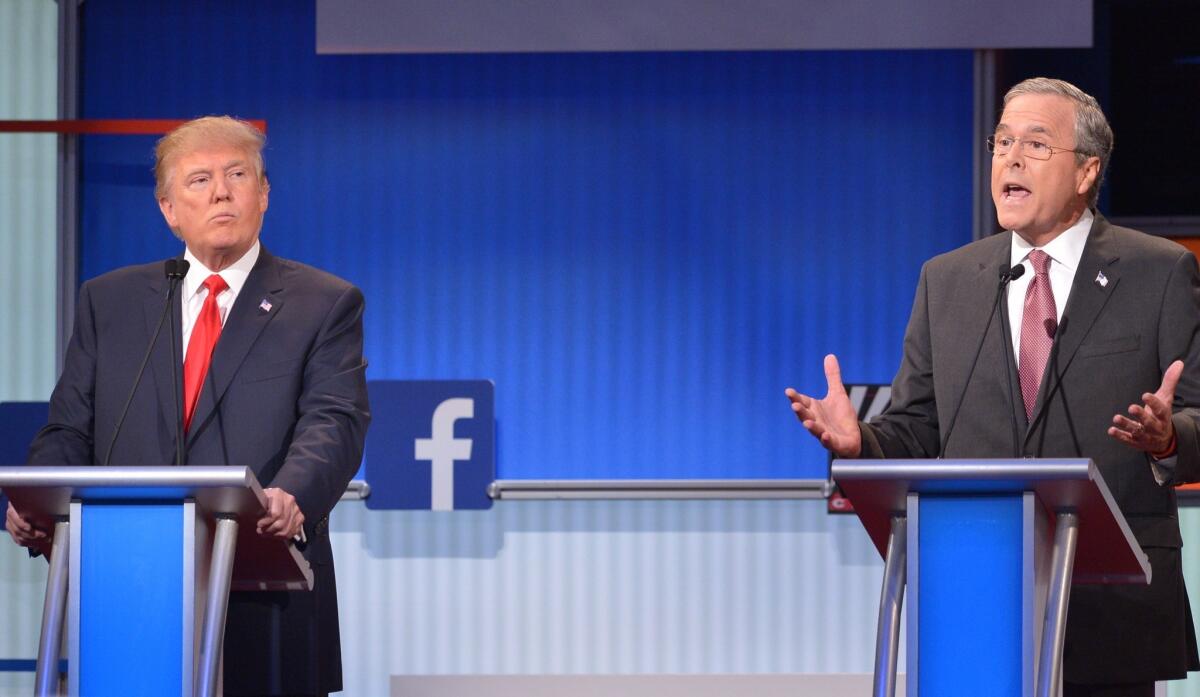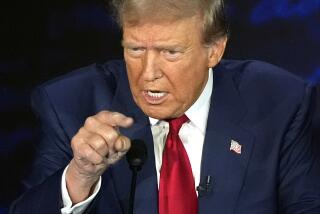Republican debate dilemma: Echo sunny Reagan? Or go negative?

Donald Trump, left, and Jeb Bush, pictured at the first Republican presidential primary debate on Aug. 6 in Cleveland, will face off with other GOP contenders Wednesday at the Ronald Reagan Presidential Library in Simi Valley.
When the Republican hopefuls gather Wednesday at the Reagan Library for their second debate, the presidential candidates will have a chance to discuss their differences over taxes, immigration, same-sex marriage and a whole host of issues dividing the large field.
But beyond disagreements over walling off Mexico or how the tax code should treat hedge-fund millionaires, there lies a deeper divide — a split that goes to the core of each contestant, how they view the world and the attitude they would bring to the White House.
Fundamentally, it is a clash between optimism and pessimism, between those channeling the anger of unhappy voters and those aiming, in the style of the sunny Ronald Reagan, for inspiration and uplift.
Jeb Bush speaks often of a country “on the verge of the greatest time to be alive in this world.” Donald Trump sees America “in serious trouble,” lamenting, “We can’t do anything right.”
The former Florida governor and the New York real estate magnate — one embodying the party establishment, the other a classic political outsider — stand furthest apart on the GOP’s spectrum of lightness and dark. But tonally, the contrast is not just between those two.
“This idea that we’re not great or that we have to make American great again — that’s not the issue,” Florida Sen. Marco Rubio said, slapping at Trump’s campaign slogan. “We are great.”
Ohio Gov. John Kasich suggested it was fine for Democrats and Republicans to disagree. But “I don’t want to be a voice of negativity in America,” he said. “I want to be a voice of positivity.”
Others deliver a harsher message, mirroring the widespread grievance that turns up in repeated polls.
Wisconsin Gov. Scott Walker, whose angry tenor has risen as his campaign struggles, assails fellow Republicans on Capitol Hill, accusing them of cowardice and of failing to deliver the conservative revolution they promised. He vows to “wreak havoc” on Washington.
Texas Sen. Ted Cruz, his temperature set to slow boil, swipes at “the Washington cartel” and leaders of both political parties. He was apocalyptic in his attack on the nuclear deal with Iran: “People will die” as a result, he said, and supporters of the bargain will have blood on their hands.
That’s a long way from “Morning in America.”
President Reagan made that roseate tableaux the centerpiece of his 1984 reelection campaign, and it endures as a model of political buoyancy and radiance.
At the time, the country was emerging from the worst economic slump since the Great Depression, with a jobless rate approaching 11% — higher than it reached in the steep downturn under President Obama.
A second Reagan term was hardly a given. But following a script drafted by his longtime strategist, Stuart Spencer, the president deftly managed to project hope and good cheer without seeming callous or willfully clueless to the pain many still suffered.
In a strategy memo that surfaced after Reagan’s landslide victory, Spencer wrote, ‘’The tone of the campaign should be upbeat, but not so confidently optimistic that we are vulnerable to the charge we believe things are better than facts warrant.
‘’The future vision the president establishes should include challenges,’’ Spencer said, ‘’but reaffirm our faith in the country’s ability to progress and meet those challenges.’’
In a recent interview, Spencer said the strategy worked in good part because it reflected Reagan’s natural persona.
“He had that. He could be upbeat, could sound like a preacher because his style lent to it,” Spencer said. “It happened to be his true belief system. What you saw is what you got.”
Those who know their candidates say, they, too, are simply being who they are.
“Jeb Bush is an optimist,” said Mike Murphy, who is running a pro-Bush political action committee and has worked with the former governor for decades. “He’s running an authentic campaign as an optimist.”
No one, in turn, would doubt that Trump is anything but the born-and-bred, sock-in-the-nose New Yorker who burst into the Republican race, then elbowed his way to the top.
The country has changed vastly since Reagan left office. The Cold War has ended; technology has refashioned the biggest industries and the tiniest facets of everyday life. If anything, after an impeached president and unpopular war, people are even more cynical about politics and the political system.
“Americans want their president to be optimistic and bullish,” said Don Sipple, a veteran political strategist who helped shape campaign messages for George W. Bush and Arnold Schwarzenegger. “But in addition, you’ve got to level with people. In our current culture, people know b.s. when they see it or hear it.”
As they honor Reagan at his namesake library in Simi Valley, the Republican candidates will bask in the warm memories that shroud the nation’s 40th president. What will shine through strongest, though, is their own personal disposition.
Reagan, an actor by training, knew some things couldn’t be faked.
Twitter: @markzbarabak
More to Read
Sign up for Essential California
The most important California stories and recommendations in your inbox every morning.
You may occasionally receive promotional content from the Los Angeles Times.











